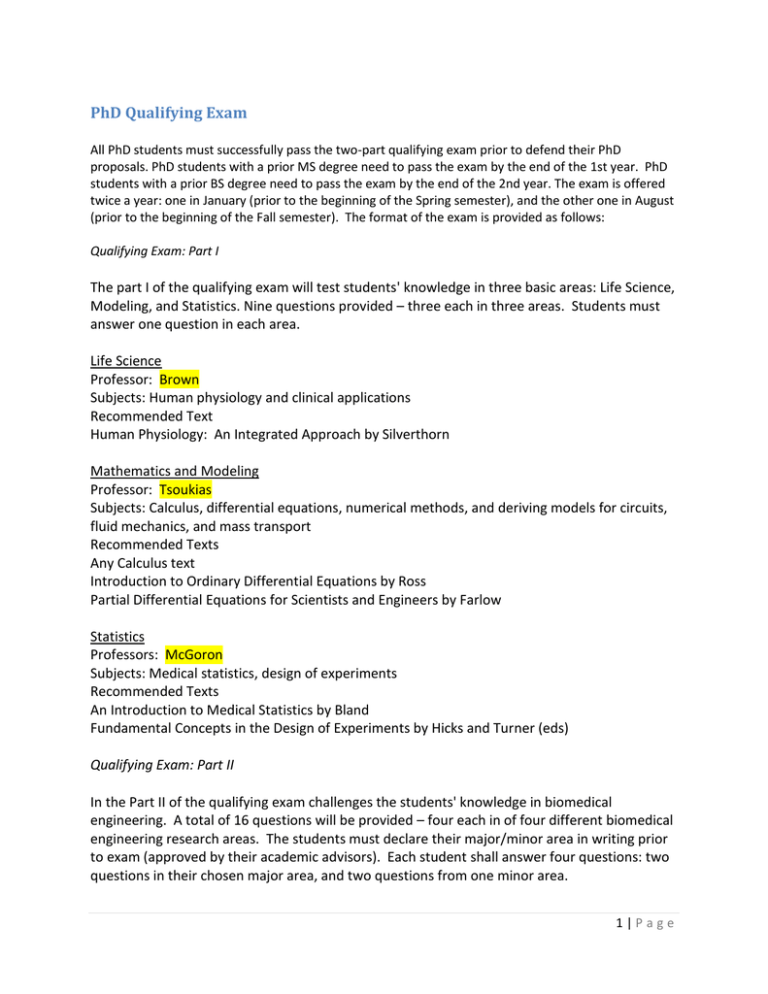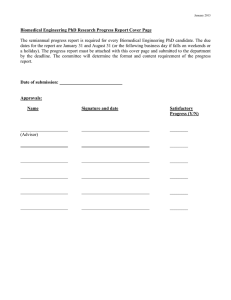PhD Qualifying Exam - Biomedical Engineering
advertisement

PhD Qualifying Exam All PhD students must successfully pass the two-part qualifying exam prior to defend their PhD proposals. PhD students with a prior MS degree need to pass the exam by the end of the 1st year. PhD students with a prior BS degree need to pass the exam by the end of the 2nd year. The exam is offered twice a year: one in January (prior to the beginning of the Spring semester), and the other one in August (prior to the beginning of the Fall semester). The format of the exam is provided as follows: Qualifying Exam: Part I The part I of the qualifying exam will test students' knowledge in three basic areas: Life Science, Modeling, and Statistics. Nine questions provided – three each in three areas. Students must answer one question in each area. Life Science Professor: Brown Subjects: Human physiology and clinical applications Recommended Text Human Physiology: An Integrated Approach by Silverthorn Mathematics and Modeling Professor: Tsoukias Subjects: Calculus, differential equations, numerical methods, and deriving models for circuits, fluid mechanics, and mass transport Recommended Texts Any Calculus text Introduction to Ordinary Differential Equations by Ross Partial Differential Equations for Scientists and Engineers by Farlow Statistics Professors: McGoron Subjects: Medical statistics, design of experiments Recommended Texts An Introduction to Medical Statistics by Bland Fundamental Concepts in the Design of Experiments by Hicks and Turner (eds) Qualifying Exam: Part II In the Part II of the qualifying exam challenges the students' knowledge in biomedical engineering. A total of 16 questions will be provided – four each in of four different biomedical engineering research areas. The students must declare their major/minor area in writing prior to exam (approved by their academic advisors). Each student shall answer four questions: two questions in their chosen major area, and two questions from one minor area. 1|Page Biomaterials, Biomechanics and Bionanotechnology Professors: Christie and Li Subjects: Cardiovascular fluid mechanics and biomaterials Recommended Texts Biomechanics: Circulation by Fung Bioelectronics, Editors: Itamar, Willner and Eugenii Katz Biomaterials Science: Introduction to Materials in Medicine by Ratner, Hoffman, Schoen, and Lemans Bio-instrumentation, devices and sensors Professors: Barreto and Lin Subjects: Biomedical signal processing and medical instrumentation Recommended Texts Biomedical Signal Processing and Modeling by Bruce Medical Instrumentation: Application and Design by Webster (ed) Cellular and Tissue Engineering Professors: Ramaswamy and Huang Subjects: Tissue engineering and cell culture methods, drug and biotransport phenomena Recommended Texts Biomaterials Science: Introduction to Materials in Medicine by Ratner, Hoffman, Schoen, and Lemans Culture of Animal Cells: A Manual of Basic Technique by Freshney Transport Phenomena in Biological Systems by Truskey, Yuan, and Katz Basic Transport Phenomena in Biomedical Engineering by Fournier Bioimaging and Biosignal Processing Professors: Adjouadi and Godavarty Subjects: Digital image processing, medical imaging modalities, and tissue optics Recommended Texts Foundations of Medical Imaging by Cho, Jones, and Singh Digital Image Processing by Gonzalez and Woods Optics by E. Hecht The exam will be graded by the professors assigned to the exam areas. The students must pass all questions answered in order to pass the exam. All students failed one or more areas in their first Qualifying Exam shall retake the exam when it is offered the next time. In the retake exam, students will receive only one question in each area they failed in their first attempt. If a student fails one or more questions from the core areas (i.e., Life Science, Mathematics and Modeling, and Statistics) in the retake exam, he/she will be dropped from the program. If a student fails two or more questions from the BME specialty areas (i.e., Day II of the Exam), he/she will be dropped from the program. If a student fails one question from the BME specialty areas (i.e., Day II of the Exam), the graduate program committee in consultation with faculty will determine if he/she should stay in the program. Research Adviser Selection 2|Page Incoming graduate students usually are paired with a faculty adviser according to their study plans. This initial pairing is not permanent; students are encouraged to contact all faculty members and explore different research areas before they select their PhD research areas. Nevertheless, the students are required to declare their major professors before the end of the first year in the program. Once selected, the students will be mentored and advised by their major advisers throughout their PhD studies. 3|Page
